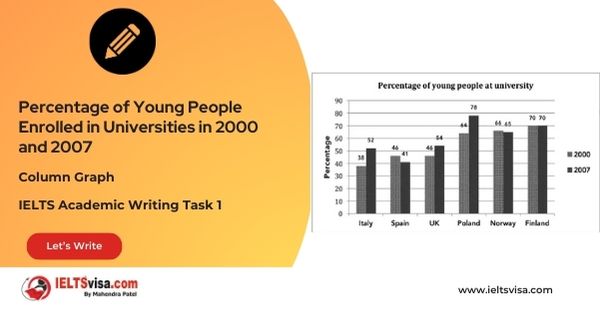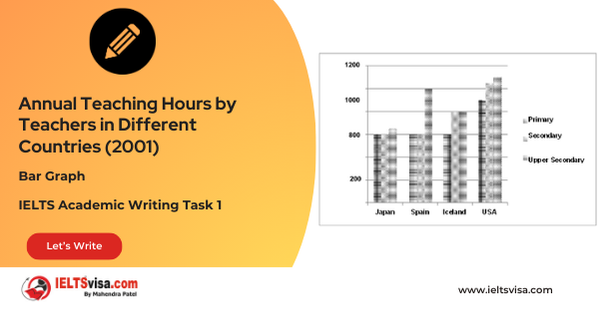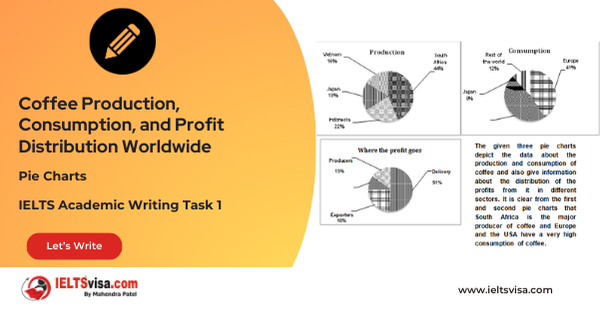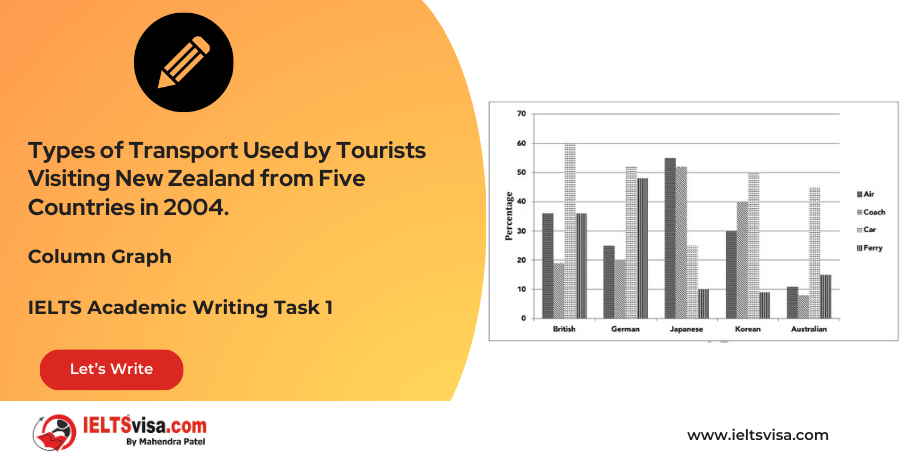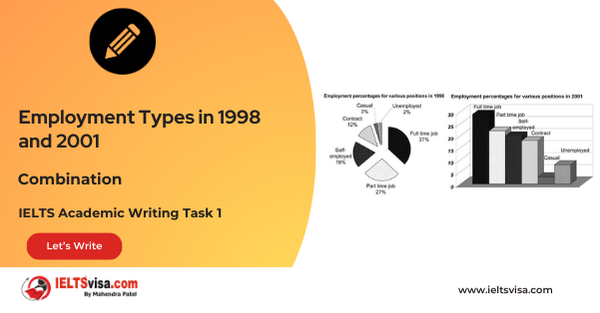The percentage of dependents in 2000 and the predicted figures in 2050 in five countries, and also gives the world average
IELTS Academic Writing Task 1 - Bar Graph
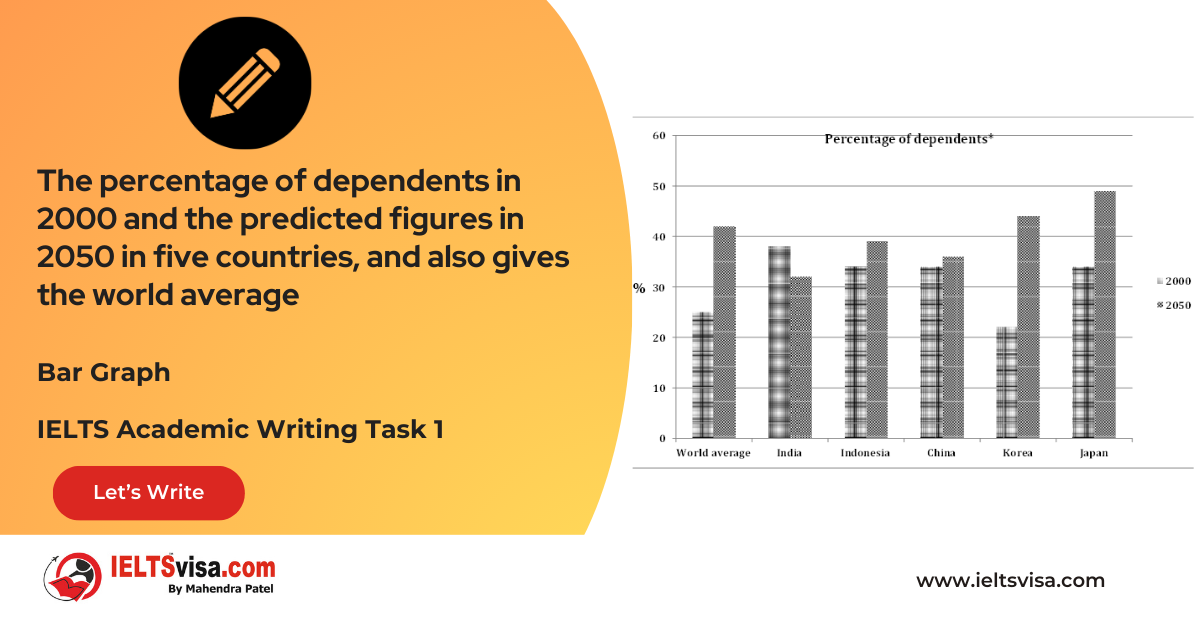
IELTS Writing Task 1 Question
The graph below shows the percentage of dependents in 2000 and the predicted figures in 2050 in five countries, and also gives the world average. Summarise the information by selecting and reporting the main figures and make comparisons where relevant
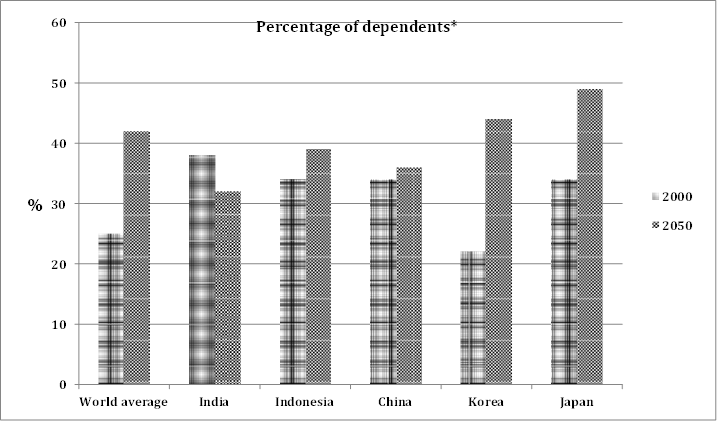
Common Questions for the Bar Graph
1. Graph Type: Column Graph
2. Title: Percentage of Dependents in 2000 and Predicted Figures in 2050
3. Units of Measurement: Percentage (%)
4. Who: Five countries and the world average
5. When: Year 2000 and predictions for 2050
6. Where: Five different countries
7. Topic: Comparison of the percentage of dependents
Comparison Showing and Trends Any change over time (such as an increase or a decrease) is a trend.
Comparison 1 : Current Statistics (2000)
- Details:
1. India: Highest percentage of dependents at 38%
2. Japan, Indonesia, China: Approximately 34%
3. Korea: Lowest percentage at 22%
4. World Average: 25%
Comparison 2 : Predictions for 2050
-
Details:
- India: Expected decrease from 38% to 32%
- Korea: Anticipated increase to 44% (doubling the percentage)
- Japan: Projected rise of about 15%
- China: Least increase, expected to rise by only 2%
- Indonesia: Projected increase, details not specified
- World Average: Expected to rise from about 25% to nearly 42%
Sample Answer
The column graph illustrates the percentage of dependents (children under 15 and adults over 65) in five countries in the year 2000, along with projections for 2050. Additionally, it shows the world average for these two years.
In 2000, India had the highest percentage of dependents at 38%, followed closely by Japan, Indonesia, and China, each with approximately 34%. Korea had the lowest percentage of dependents, recorded at 22%. The overall world average of dependents stood at 25%.
Looking ahead to 2050, an increase in the percentage of dependents is anticipated for Indonesia, Korea, China, and Japan. Conversely, India is expected to see a decline in its dependent population, dropping from 38% to 32%. In Korea, the dependent percentage is projected to double to 44%. Japan is forecasted to experience a rise of around 15%, while China is predicted to show the smallest increase of just 2%. The world average of dependents is expected to rise significantly, from approximately 25% to nearly 42%.
Overall, while India is predicted to experience a decrease in its dependent population, the other four countries are projected to see an increase.
Top 5 Vocabularies
| Vocabulary (type) | Type | Meaning | Synonyms | Examples |
| Illustrate | Verb | To explain or clarify through examples or visuals | Demonstrate, depict, show | “The graph illustrates the percentage of dependents in various countries.” |
| Dependents | Noun | Individuals who rely on others for financial support, typically children and elderly | Reliants, beneficiaries, dependents | “India had the highest percentage of dependents in 2000.” |
| Projected | Adjective | Estimated or forecasted for the future | Predicted, anticipated, expected | “The projected figures for 2050 indicate an increase in dependents.” |
| Decline | Verb | A decrease or reduction in quantity | Decrease, drop, fall | “India is expected to see a decline in its dependent population.” |
| Average | Noun | The typical value or mean of a set of data | Mean, median, norm | “The world average of dependents is anticipated to rise significantly.” |
|
Percentage |
Noun |
A rate or proportion in relation to 100 |
Ratio, proportion |
“India had the highest percentage of dependents in 2000.” |
|
Projection |
Noun |
An estimate or forecast based on current data |
Estimate, forecast, prediction |
“The projections for 2050 show an increase in the dependent population.” |
|
Anticipate |
Verb |
To expect or foresee something in the future |
Expect, foresee, predict |
“It is anticipated that the percentage of dependents will rise in most countries.” |
|
Forecast |
Noun |
A prediction or estimation of future events or trends |
Prediction, projection |
“The forecast for 2050 shows a significant rise in the global dependent population.” |
|
Rise |
Noun/Verb |
To increase or go up |
Increase, grow, climb |
“Japan is forecasted to experience a rise of around 15% in its dependent population.” |
|
Decrease |
Noun/Verb |
A reduction in quantity or number |
Decline, drop, reduction |
“India is expected to see a decrease in its dependent population.” |
|
Proportional |
Adjective |
Corresponding in size or amount to something else |
Corresponding, equivalent |
“The dependent population is expected to rise proportionally in many countries.” |
|
Expected |
Adjective |
Regarded as likely to happen in the future |
Predicted, anticipated |
“The expected increase in the dependent population is significant in most countries.” |
|
Exceed |
Verb |
To go beyond or surpass a limit or expectation |
Surpass, outstrip |
“Japan’s dependent population is expected to exceed 40% by 2050.” |
|
Significant |
Adjective |
Important enough to have an effect or influence |
Substantial, noteworthy |
“The increase in the world average of dependents is highly significant.” |
|
Slight |
Adjective |
Small or minor in degree or amount |
Small, minor, trivial |
“China’s increase in dependents is projected to be slight compared to other countries.” |
|
Compare |
Verb |
To examine similarities and differences between things |
Contrast, match |
“The dependent population in India is higher when compared to Korea.” |
|
Estimate |
Noun |
An approximation of the value or amount of something |
Calculation, approximation |
“The estimate for the dependent population in 2050 shows an upward trend.” |
|
Level |
Noun |
A particular stage or degree of something |
Degree, rank, tier |
“The dependent level is expected to rise dramatically in Korea by 2050.” |
|
Rate |
Noun |
A measure or quantity measured against another |
Speed, pace, ratio |
“The rate of increase in dependents will be highest in Korea.” |
|
Declining |
Adjective |
Becoming smaller, fewer, or weaker |
Diminishing, decreasing |
“India’s dependent population is declining over time.” |
|
Remain |
Verb |
To stay in the same place or condition |
Stay, persist, continue |
“The dependent percentage in India is expected to remain lower than in other countries by 2050.” |
|
Growth |
Noun |
The process of increasing in size, number, or importance |
Expansion, increase, rise |
“The growth of the dependent population is significant in most countries.” |
|
Stable |
Adjective |
Not changing or fluctuating |
Steady, constant, unchanging |
“Korea is projected to maintain a stable level of dependents at 22% in the early years.” |
|
Double |
Verb |
To increase twofold or to multiply by two |
Double, duplicate, replicate |
“Korea’s dependent percentage is expected to double by 2050.” |
|
Significantly |
Adverb |
In an important or notable way |
Remarkably, substantially |
“The world average of dependents is expected to rise significantly by 2050.” |
|
Projections |
Noun |
Estimated forecasts about future trends |
Forecasts, estimates, predictions |
“The projections for the future indicate an overall increase in dependent populations.” |

Our Books
Master IELTS Speaking Part 1
IELTS Writing Task 1 Book
IELTS Writing Task 2 Book
Writing Task 1 Question Types
Practice IELTS Other Modules
IELTS Listening
The IELTS Listening test assesses how well you can understand spoken English in various contexts. It lasts about 30 minutes and is divided into four sections with a total of 40 questions. The listening tasks become increasingly difficult as the test progresses.
IELTS Academic Reading
The IELTS Academic Reading section assesses your ability to understand and interpret a variety of texts in academic settings. It is designed to evaluate a range of reading skills, including skimming for gist, reading for main ideas, reading for detail, understanding inferences, and recognizing a writer's opinions and arguments.
IELTS Speaking
The IELTS Speaking test assesses your ability to communicate in English on everyday topics. It lasts 11-14 minutes and consists of three parts: introduction, cue card, and a discussion based on the cue card topic.
IELTS General Reading
IELTS General Reading tests your ability to understand and interpret various types of texts. Here are some key areas and types of content you can expect to encounter in the reading section, along with tips for effective preparation.
IELTS Academic Writing Task 1
In IELTS Academic Writing Task 1, you are presented with a visual representation of information, such as graphs, charts, tables, or diagrams, and you are required to summarize, compare, or explain the data in your own words.
IELTS General Writing Task 1
In IELTS General Writing Task 1, you are required to write a letter based on a given situation. The letter can be formal, semi-formal, or informal, depending on the prompt. Here’s a breakdown of the key components to include in your letter
IELTS Academic Writing Task 2
In IELTS Academic Writing Task 2, you are required to write an essay in response to a question or topic. Here’s a guide to help you understand the essential elements of this task
IELTS Exam Tips
To succeed in the IELTS exam, practice regularly, familiarize yourself with the test format, improve your vocabulary, develop time management skills, and take mock tests to build confidence.
Grammer for IELTS
Grammar is the foundation of effective communication in English. Understanding tense usage, subject-verb agreement, and sentence structure enhances clarity and coherence in writing and speaking.
Vocabulary for IELTS
Vocabulary plays a crucial role in the IELTS (International English Language Testing System) exam, especially in the Speaking and Writing sections. Here’s an overview of why vocabulary is important and how it impacts your performance
RECENT IELTS SAMPLES QUESTIONS AND ANSWERS
Task 1 – Column graph – Percentage of Young People Enrolled in Universities in 2000 and 2007.
20:00 Start Pause Stop [df_adh_heading title_infix="IELTS Writing Task 1 Question" use_divider="on"...
Task 1 – Bar Graph – Annual Teaching Hours by Teachers in Different Countries (2001)
20:00 Start Pause Stop [df_adh_heading title_infix="IELTS Writing Task 1 Question" use_divider="on"...
Task 1 – Pie Charts – Coffee Production, Consumption, and Profit Distribution Worldwide
20:00 Start Pause Stop [df_adh_heading title_infix="IELTS Writing Task 1 Question" use_divider="on"...
Task 1 – Column graph – Types of Transport Used by Tourists Visiting New Zealand from Five Countries in 2004.
20:00 Start Pause Stop [df_adh_heading title_infix="IELTS Writing Task 1 Question" use_divider="on"...
Task 1 – Bar and Pie Chart Combination – Employment Types in 1998 and 2001
20:00 Start Pause Stop [df_adh_heading title_infix="IELTS Writing Task 1 Question" use_divider="on"...
Task 1 – Diagram – Comparison of Stone Tool Development Over Time
20:00 Start Pause Stop [df_adh_heading title_infix="IELTS Writing Task 1 Question" use_divider="on"...

